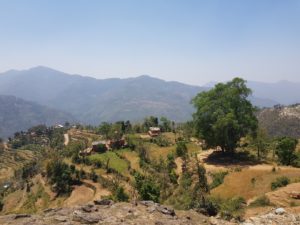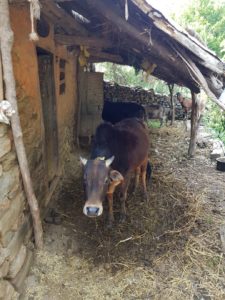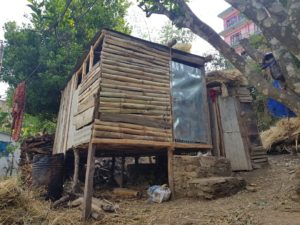By Melanie Channon
In 2014 the UN Human Rights Council (finally) formally acknowledged the link between menstruation and gender equality. Until recently, research around menstruation, where it existed, was bio-medically focused, ignoring the myriad of related social and cultural issues. Good menstrual hygiene is a right, but is only just beginning to be recognized as such.
We lack data to answer basic questions about menstruation – such as what affects the average age at menarche – and basic definitions, such as what counts as good menstrual hygiene in different contexts. Large cross-country surveys (e.g. Demographic and Health Surveys) generally include questions about menstruation only if they relate directly to reproduction; for example, they might ask about postpartum amenorrhea (temporary infertility after having a baby), but not about dysmenorrhea (period pain).
In April I travelled to Dailekh District, Nepal to participate in fieldwork for a project looking at menstrual hygiene and menstrual taboos amongst adolescent girls there. We wanted to know how girls managed their menstruation, what traditional practices they followed in relation to menstruation and how they felt about this. In particular, we were interested in chhaupadi, which is the practice of being secluded away from the house for five days every menstrual period; this means sleeping in a hut or cow shed for 5 days every month. Following a series of chhaupadi related deaths, enforcing this practice has recently been made illegal in Nepal and is theoretically punishable by a fine or imprisonment. In reality no convictions have been made and it is unclear if people in the mid- and far-West of the country, where it is most common, even know about the ban.
 Dailekh District, Nepal
Dailekh District, Nepal
Dailekh is a hilly district in Karnali Province. Child marriage is common and women still have an average of more than four children, compared to less than two in Kathmandu (the capital). Agriculture and remittances provide the main sources of income. Water is scarce. For most people we spoke to it took over an hour to get to the communal tap, and once there they might have to queue for another hour to use it. This had a serious effect on menstrual hygiene as it took three hours or more to wash and dry the rags that women and girls were using as sanitary protection.
There used to be many purpose built huts for use during menstruation, but large numbers were dismantled during the civil war. We found a wide variety of sleeping arrangements used to practice chhaupadi including a purpose built hut, a communal space above the animal shed, space in the cattle shed, sleeping outside, and a separate room attached to the house. One girl said she did not practice chhaupadi, but that she had to sleep on the floor next to her bed during menstruation. We found that while the form varied, chhaupadi was virtually universal.
 An animal shed which women and girls share with the cattle during menstruation
An animal shed which women and girls share with the cattle during menstruation
Many other restrictions were in place during menstruation. We asked about toilet facilities and were surprised to find that many women and girls could not use the normal toilet during menstruation. They had to go to the fields. They were also often not allowed to go in the kitchen (or even the house sometimes), eat many normal foods (e.g. dairy, meat, pickle etc), touch male family members, go to temple, and many others. Those five days had a substantial impact, but the practices were completely normalised and people were more than happy to talk about them with us.
We wanted to know why women and girls still followed these practices so strictly. The answer was that they were afraid of what the gods would do if they did not. Many thought that snakes would enter their homes or family members would become sick if they did not follow chhaupadi. One girl believed her legs would be broken. Another woman told us that she made a very small transgression during menstruation (allowing her used cup to enter the family home) and that they then found a large snake in their bag of rice. Ironically, we were also told about a girl who was bitten by a snake while sleeping outside during menstruation; she died. A lot of women and girls told us that they did not mind menstrual restrictions as they believed strongly in the power of the gods to retaliate. The ban on chhaupadi was largely seen as irrelevant by the people we spoke to. It even has the potential to be harmful if enforced in the wrong way as we heard stories of purpose built menstrual huts being torn down, but women and girls continuing to practice chhaupadi by sleeping outside or with the animals. Where there were purpose built huts and rooms these tended to be much safer and more sanitary than sleeping with the animals and their dung, or outside.

A purpose built chhaupadi hut for staying in during menstruation
The secondary school we visited had no running water on site and pupils were expected to bring their own water from home. The staff at the school recognized that the lack of water was a problem and were in the process of building a pipe to try and bring water in. They were also part of a project run by an NGO to provide free sanitary pads. The NGO had provided the school with the pads and they were now sitting in a locked cupboard. The distribution system set up was that pupils needed to ask their teachers for a pad if they needed one, but every teacher in the school bar one was male and the girls don’t feel comfortable asking a man for pads; No effort had been made on the part of the school to provide any extra information on menstruation or to think of better ways to get the pads to the girls who needed them. This is particularly frustrating as we had no trouble talking to women, girls (and even men) about menstruation; women and girls were very frank and had no trouble describing how they experienced menstruation and what would make it better. All the school needed to do was ask the girls what they needed and make sure female staff members were available to talk to.
Being able to experience menstruation in safety and comfort is increasingly recognized as a human right. Many women and girls we spoke to lacked privacy to change sanitary materials by being denied access to toilets, lacked water to wash, and were exposed to unnecessary dangers by sleeping in exposed or unsanitary locations during their menstruation. These practices are deeply rooted in local culture and religion, meaning that simply providing some sanitary pads will do very little and tearing down the chhaupadi huts can do more harm than good. Improving the experience of menstruation in this region requires talking to those who experience menstruation and developing an intervention in partnership with the community; there is no quick fix.
Respond